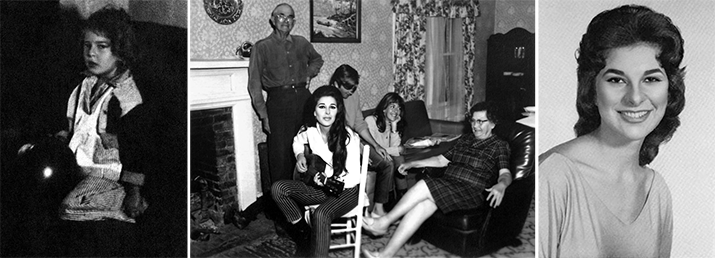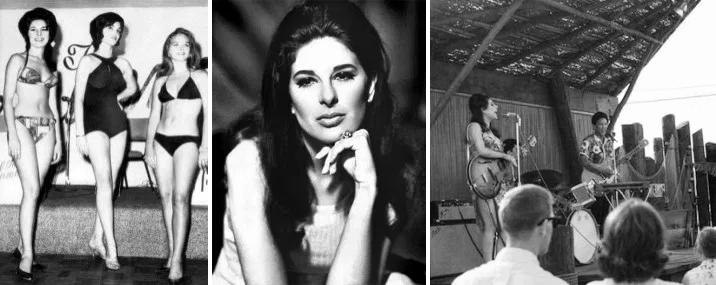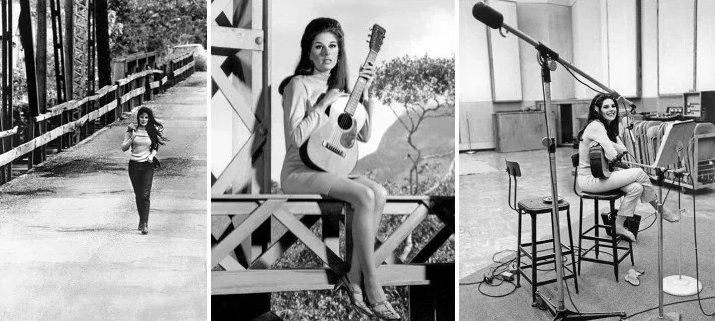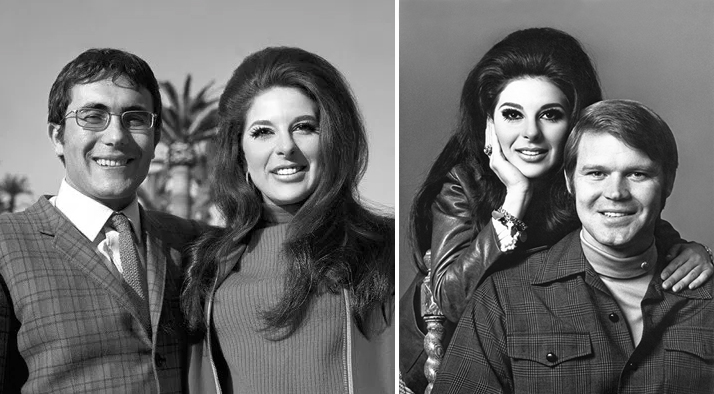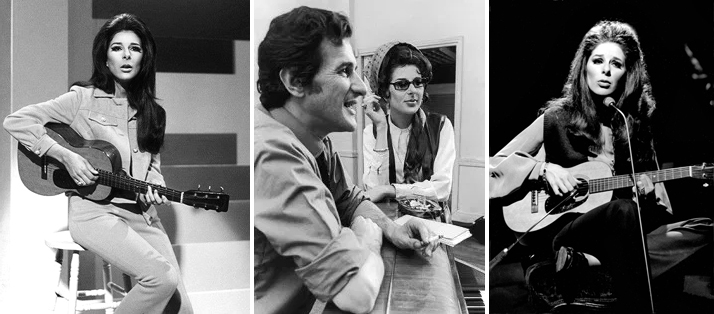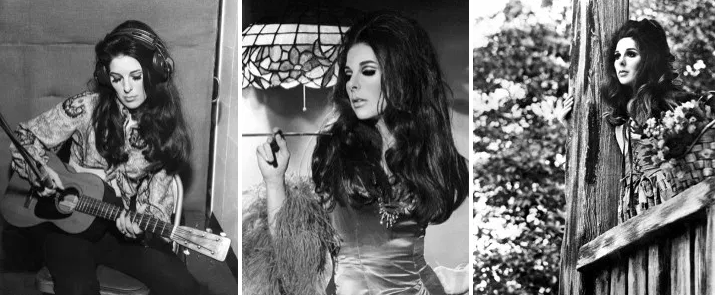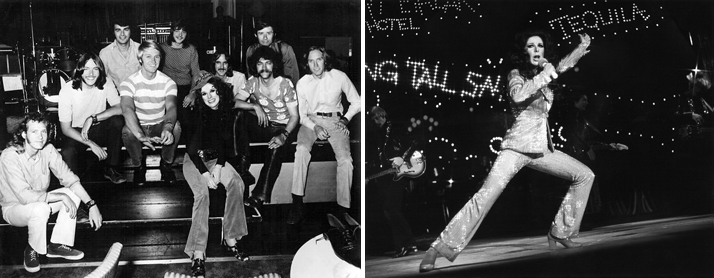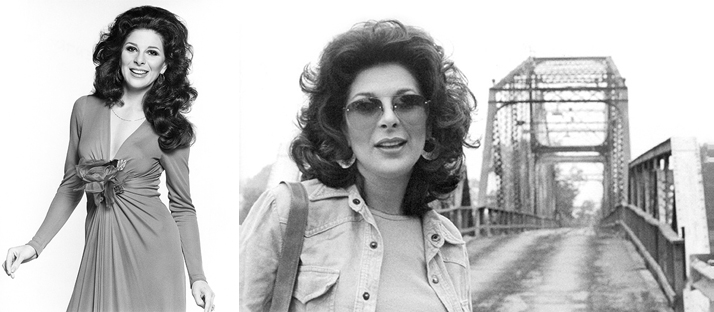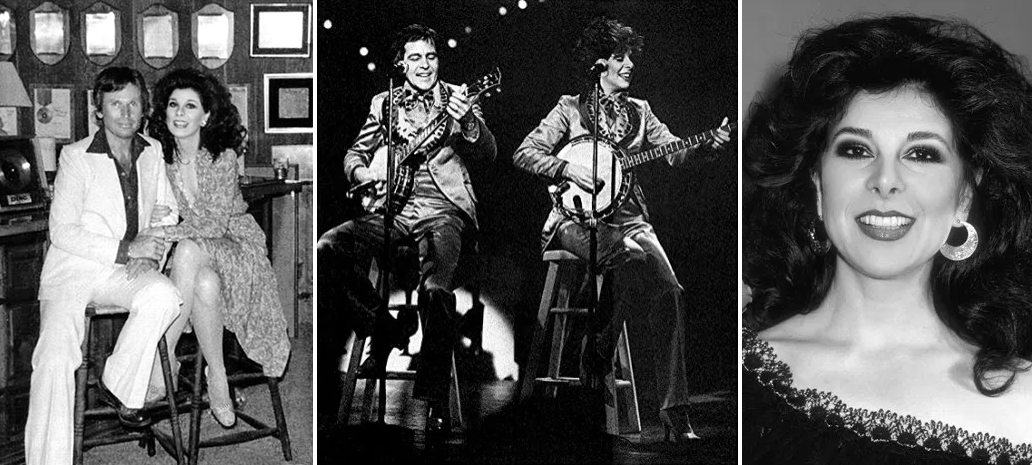Biography
Bobbie Gentry was one of the first female musicians who wrote, produced and even published her own music.
Born in Chickasaw County, she is remembered for her Southern themed narrative songs including her classic recordings Fancy and her debut single Ode To Billie Joe which became a U.S. number one hit and a worldwide sensation. Bobbie released seven albums on Capitol including her defining works Patchwork, The Delta Sweete and Ode to Billie Joe, before her self-imposed retirement. She also had a successful partnership with Glen Campbell with whom she recorded an album of duets.
Bobbie’s career fell neatly into two halves: After releasing her final album in 1971 she re-invented herself as a live entertainer and for the remainder of the 70’s starred in her own lavish stage productions primarily in Las Vegas, where in the mid 70’s she broke attendance records. Bobbie was a ubiquitous presence on American and British television of the 60’s and 70’s appearing on countless shows and having her own specials on CFTO and CBS. At a time when TV executives didn’t believe a woman could front a prime time programme, in 1968 she became the first female songwriter to host her own TV series on the BBC.
Years ahead of her time, Bobbie was also a keen businesswoman: Within months of the success of her first single, she established two music publishing companies, organized beneath her parent company Gentry Ltd which among other activities produced her live shows. Later when she was primarily performing, she negotiated her own multi-million dollar contracts. In the early 1980’s she retired from show business, and has not performed or recorded since.
Early Years
Bobbie was born Roberta Lee Streeter, on the 27th July 1942, in a little farm outside the town of Woodland in Chickasaw County, Mississippi, she spent her childhood years on her paternal grandparents’ farm, after her own parents divorced, where she grew up without electricity or plumbing. In a 1973 Mid-South magazine cover story, she remembered, “My grandmother noticed how much I liked music, so she traded one of her milk cows for a neighbor’s piano,” she said, sounding like a line from one of her own songs. “When I was still very young, I used to sit and listen to jazz music and blues music from New Orleans on an old battery-powered radio, since we didn’t have electricity on the farm. Then I’d go over to the piano and try to pick out the tunes.” The story goes that, at the age of 7, she composed her first song, called My Dog Sergeant Is a Good Dog — using only the black keys, because that’s how she watched the church pianist play. Years later, she cheerfully performed the track at the piano in her 1968 BBC TV series. Her early life is peppered with such stories that over time have coalesced into a version of the classic American dream.
For a few years, she lived in Greenwood, Mississippi with her father, and while attending high school there, she learned to play the guitar and banjo. At age 13, she moved to Palm Springs, California, to live with her mother. For a time the two of them appeared as the duo Ruby and Bobbie Meyers. The affluence of life in Palm Springs was very different from the austerity of life on a farm without electricity. She picked up her stage name from the 1952 film Ruby Gentry which she saw on television. In the film Ruby played by Jennifer Jones was a poor but beautiful girl from the backwoods who ended up marrying the town tycoon: It seemed a good fit. “My mother’s name is Ruby,” she told a reporter, “and I was intrigued with that movie and started using that name. I like it still.”
After graduating from high school in 1960, Bobbie moved to Los Angeles, where she studied philosophy at UCLA before transferring to the Los Angeles Conservatory of Music, where she took classes in composition, music theory and arranging. In California, Bobbie had a brief career modelling swimsuits, and in the evening sang and danced at nightclubs in Los Angeles and Las Vegas all the while writing her own songs. Bobbie’s recording career began with rockabilly legend Jody Reynolds: Whilst attending a concert of his at a club in Palm Springs in 1966, Bobbie asked if she could sit in on a song, this led to her being invited to sing on two duets Stranger In The Mirror and Requiem For Love. The tracks were recorded and a 7″ was released on Titan records in September 1966 but it failed to make any chart headway.
Recording Career
Whilst intermittently gigging with Jody Reynolds, Bobbie formed a Hawaiian themed troupe called the International Four, that picked up a local following performing in Vegas, Tahoe, Oxnard and Palm Springs, during this time she began recording a total of 12 songs that would form the basis of her debut album. Despite performing regularly, initially Bobbie’s sole ambition was to write songs to sell to other artists, telling the Washington Post that she only sang on the recording of Ode to Billie Joe she took to Capitol because it was cheaper than hiring a professional.
Also delivered to Capitol was the track Mississippi Delta, and it was this recording rather than Ode that initially got her signed. It was only after the now famous string arrangement by Jimmie Haskell had been dubbed onto Bobbie’s original recording of Ode To Billie Joe that Capital’s A & R team decided definitively that it would be the A-Side. The song was released on 10th of July, and hit the number one spot on the 26th of August. Despite protracted debate about what the narrator threw ofF the bridge (Bobbie always said it wasn’t important), the essential mystery of Bobbie’s song is one that can never be fully resolved, hence its endurance.
The following album was a unique combination of blues, folk and jazz elements, that furthered Bobbie’s recollections of her homeland, and felt more like a concept album than a hastily assembled collection of songs: It was in stores less than a month after it was completed. Almost overnight the ‘girl from Chickasaw County’, was a superstar, prompting one writer to proclaim, “Bobbie Gentry is the most exciting thing to happen to popular music since the Beatles.” Indeed the album Ode to Billie Joe knocked Sgt Pepper off the top spot and earned her three Grammy awards for Best New Artist (the first country singer to win in this category), Best Female Pop Vocal and Best Contemporary Song. Within months of the success of her first single, Bobbie established two publishing companies, Super Darlin’ Productions (ASCAP) and Footboat (BMI) and organized them beneath her parent production company Gentry Ltd.
In February 1968 Bobbie took part in the Italian Song Festival in San Remo, alongside Al Bano with the song La Siepe. In a competition of 24 songs, the entry made it to the final 14 and was eventually placed ninth. Capitol released the song concurrently as a single. The following month Bobbie’s second album The Delta Sweete was released. Whilst it may not have contained anything as career defining as the song Ode to Billie Joe, it did represented a definite step forward from her debut in its musical ambition: The result was a multi-faceted quasi-concept album about Bobbie’s Mississippi delta roots where each track blurred, dream-like, into the next; a pungent evocation of her childhood that further deepened her fascination with charade, illusion and the often comic absurdity of the conventions of everyday life. The album failed to match the success of its predecessor, but nevertheless it remains one of the great unsung masterpieces of the 60’s.
Bobbie continued to write and produce her own songs, telling Mid-South magazine, “I don’t really have a great time doing it, but I have a need to write. I am driven to being industrious, and the finished product is well worth the effort.” Bobbie’s third album Local Gentry was her second release that year, coming out in October 1968. The quality of her songwriting remained high, particularly on the black humoured Caskette Vignette which features an undertaker callously fast-tracking a bereaved fiancée. Bobbie’s third album release of 1968 was a duets album with label mate and fellow ‘country’ star Glen Campbell. The partnership was a great success, resulting in three hit singles and a Gold album, even though artistically it was perhaps her least satisfying release to date.
Bobbie’s performances and on-screen charisma on variety programmes on both sides of the Atlantic had impressed the head of the BBC so much that in 1968 she was invited to host her own show on BBC 2 making her the first female songwriter to front a TV series on the network. Together with producer Stanley Dorfman, they made six half-hour episodes every year for three years, for a total of 18 shows spanning 1968, 1969 and 1971. She also recorded a programme for Dorfman’s BBC In Concert series in 1970, a show that would feature fellow female singer-songwriters like Joni Mitchell and Laura Nyro. Bobbie took to the TV experience like a duck to water and the BBC series was successfully syndicated all over the world apart from in America. Dorfman told author Tara Murtha “After a few episodes, she was pretty much co-directing the show because she had such great ideas. [But] the BBC wouldn’t have it, wouldn’t have an artist credited as a director or producer, so the credit went to me as producer and director. But she definitely contributed as much as I did creatively to the show. She was just full of ideas”. In 1969, she also taped four television specials for the Canadian CFTO television station for North American syndication. “If you’re a performer who likes to do a lot of things, [television is] the best field for you,” she said to New York Times reporter Judy Klemesrud. “You can get involved with everything—from writing to set design to choreography.”
In 1969 Bobbie DJed 13 one hour specials for Armed Forces Radio that aired all over the world, and in August she released her 4th solo album Touch ‘Em With Love. Different from its predecessors, the LP marked a transition away from largely self-penned collections of regional songs supplemented by sympathetically chosen cover versions by attempting to re-position her as a blue eyed soul singer over a selection of 10 songs that included only two originals. Recorded in Nashville and produced by Kelso Herston, the LP was critically acclaimed at the time, but in hindsight is perhaps her least interesting album. Nevertheless it became her most successful long player in the UK, where the single of Bacharach and David’s I’ll Never Fall In Love Again gave her a surprise number one hit. Bobbie once told a fan magazine that her work left her no time for romance, but on 18th December 1969 she married Las Vegas casino owner William Harrah; the relationship lasted only six months, but she would continue to perform in Harrah’s hotels for the rest of her professional life. Accusations of gold-digging abounded but her royalties from Capitol, her purchase of a percentage of The Phoenix Suns basketball team, as well as vast tracks of land in California, had already made her a wealthy woman.
Bobbie’s next album Fancy, released in May 1970 was also like its predecessor, largely made up of cover versions, but working with producer Rick Hall yielded a more sophisticated end result with Bobbie sounding assured, at home even, on the blue eyed soul of He Made A Woman Out of Me and Find ’em, Fool ’em Forget ’em (co-written by Hall). The rest of the album was a strong collection of covers focused around a country soul theme. Best of all was the self-penned title track: Fancy remains one of Bobbie’s most accomplished story songs- Born ‘poor white trash’, the beautiful Fancy is groomed as a hooker by her sickly impoverished mother; but ends up with an ‘elegant Georgia mansion’ and ‘a New York townhouse flat’ – no shame, no regrets. “Fancy is my strongest statement for women’s lib, if you really listen to it,” she explained to After Dark magazine in 1974. The song went on to become her most successful single since Ode To Billy Joe and earned her a Grammy nomination for ‘Best Female Pop Vocal’. A stand-alone single also produced by Rick Hall came out in June 1970 called Apartment 21, which was a melancholy rumination on the isolating monotony of life on the road.
In May 1971 Bobbie released what would turn out to be her final LP; the fittingly titled Patchwork. The album was a brilliantly diverse collection of short stories in song that effortlessly covered country, pop, soul, folk, gospel, blues and show-tune motifs, all stitched together with filmic interludes to make a cohesive whole. Although she was a reasonably prolific writer, and had produced in the past, Patchwork was in-fact Bobbie’s first collection of entirely self-written and produced material. The album showed her at the peak of her powers, and was the richest, most definite statement of her fractured brand of Americana that she had made to date. A final single for Capitol followed in August 1972; The Girl from Cincinnati was an accomplished slice of West Coast style 70’s rock, with Bobbie bringing all her pathos to bear on a story about a woman who has escaped to LA from small town middle America, and despite not hitting the big time, just can’t face giving up. From this point, Bobbie only released another three singles, one of which was a re-recording of her signature song.
Stage Career
The first six years of her career Bobbie was primarily a recording artist, and for the next six she was an entertainer appearing on stages all over the world but primarily in Las Vegas and Reno. Bobbie had started playing Vegas as early as 1968 when Howard Hughes put her on at Caesar’s Palace but it wasn’t until her recording career ended that her stage career really took off. Bobbie had regularly performed live, generally in a conventional rock setting, the difference now was that she had accumulated extensive experience on her own TV series and variety show performances on networks all over the world – their lavish sets and production values inspired her to create her own spectacular one woman show where she could dramatise her music with sets, costumes and choreography backed by a rock band: Clearly relishing the creative freedom Bobbie stated “I write and arrange all the music, design the costumes, do the choreography, the whole thing, I’m completely responsible for it. It’s totally my own from inception to performance”. Vegas had simply never seen anything like it; indeed one would have to look at modern parallels to find an equivalent.
As her recording career slipped further into the past, Bobbie performed less and less of her own compositions, basing her shows around tributes to the music of yesteryear like her drag skit homage to the Andrews Sisters, and themed segments on subjects like sex and suicide using popular songs of the day. One of Bobbie’s most talked about live segments in this period was her tribute to Elvis Presley, witnessed one night by the King himself. Over the course of her stage career Bobbie played all the major hotel theatres on the Las Vegas strip, including The Desert Inn, The Frontier, The Landmark, The Sands, The Hilton, The Sahara, Caesar’s Palace and the Aladdin. Unusually for the time, Bobbie negotiated her own contracts receiving $1 million for 20 weeks work a year, but always refusing to sign for any longer than a two-year period. From the money she received, Bobbie produced her own musical extravaganzas for her company Gentry Ltd, these always included, lavish sets, special effects, around eight dancers and five musicians and cost her over $200,000 per production, but to Bobbie it was all money well spent: “I think it is a good investment,” she told The Star. “I never panic about spending money! It gives the audience what they want and anyway, I enjoy it. I love making my shows something really special to remember, and that is where the money goes.” One night she even picked up her audience’s $7,000 dinner tab after successfully debuting a new show at the Desert Inn. Bobbie’s hard work on the circuit certainly paid off: By the mid-seventies, she was the undisputed Queen of Las Vegas breaking attendance records at the Landmark and apparently racking up more performances during her stage career than any other lady to play the strip.
During the mid-70’s Bobbie DJed another popular series on Armed Forces Radio that aired all over the world, and in 1974 she starred in four episodes for CBS of a programme based around sections of her stage show called The Bobbie Gentry Happiness Hour, but the experience was not a happy one, as the producers sanitized her creativity, disallowing her male dancers to appear in drag during the Andrews Sisters skit, and forbidding her to perform Fancy in its entirety due to the songs supposedly risqué lyric content. Also in 1974 Bobbie was asked by old friend Roger Camras to write a song for a film he was producing with Max Baer Jnr called Macon County Line. The resulting song Another Place, Another Time, was a wistful, and nostalgic country soul shuffle that played over the end credits; it was Bobbie’s last original composition to be released, coming out on a 7″ in the spring of 1975. The following year Bobbie asked Baer and Camras if they would be interested in developing a film based on her song Ode To Billie Joe; they were, and the film was released in 1976 by Warner Brothers on the 3rd of June (when else?) with a script by Herman Raucher. Bobbie re-recorded the song, this time called Ode to Billy Joe for the soundtrack LP; Warners released it as a single, whilst Capitol released the original version, resulting in two concurrent chart placing’s of the same song! In a bizarre twist of fate this meant that Bobbie’s last single to chart would be the same as her first.
In 1978 Bobbie recorded a batch of songs with producer Rick Hall for the Curb division of Warners, but no album ever materialised. A lone 7″ was released in the U.S. of Steal Away by Jimmy Hughes backed by He Did Me Wrong But He Did It Right by Patty Dahlstrom and she appeared on Johnny Carson’s The Tonight Show to promote it. On 15th October 1978 she married singer and comedian Jim Stafford and they starred together in her Las Vegas show Southern Comfort at the Aladdin, that year and again in 1979.
Her last production was at the Sahara in Las Vegas during September 1980. There was no farewell show or announcement of her retirement. In May 1981, Bobbie was one of many guest stars on the NBC special An All-Star Salute To Mother’s Day. She sang just one song: a rendition of the Broadway tune Mama, A Rainbow, dedicated to her own mother who was in the audience. What no one knew at the time was that this would be her last performance. The following year she made her last public appearance at the Country Music Awards on 29th April 1982, she was 40 years old. Since that time, she has not recorded, performed or been interviewed again.
Andrew Batt 2017


